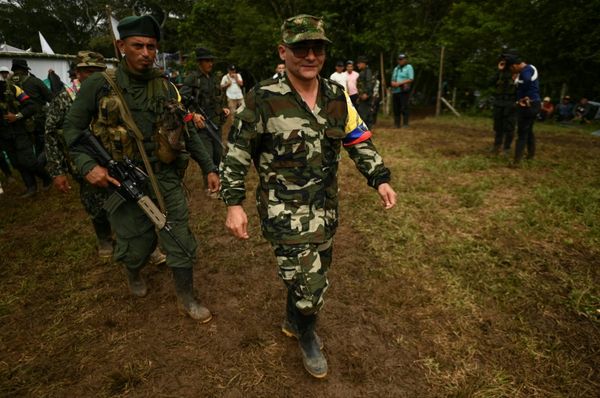AN activist who was detained by Israel after the Global Sumud Flotilla was intercepted has described the “horrific” conditions he faced inside an “internment camp”.
David Adler, the co-general director of campaign group Progressive International, was one of over 500 activists taking part in a civilian mission to deliver much-needed humanitarian aid to Gaza.
The flotilla was intercepted in international waters on October 1 , with more than 20 unidentified vessels seen approaching the fleet when it was around 80 nautical miles from Gaza.
Speaking in a voice note recorded in Jordan, he described how he was locked up in an “internment camp in the Negev desert” in what he described as “horrific conditions” with “hundreds” of others from the Global Sumud Flotilla.
"We were kidnapped, stripped, zip-tied, blindfolded and sent to [an] internment camp on a police van without any access to food, to water, to legal support and for the next five days, on and off, we were psychologically tortured”, Adler alleged.
“We were taken individually out of our cells for any kind of request for medicine or for other kinds of attention from the guards, people were taken individually out of their cells and regularly beaten and handcuffed, ankle-cuffed and left in solitary confinement.
“This happened so many times over so many days and we were asking for the most basic things like critical access to insulin for diabetic detainees that were part of the flotilla. In short, we were treated as terrorists which is what [Israeli national security minister Itamar] Ben-Gvir promised he would do.”
Progressive International shared via social media that Adler had been released from Israel on Tuesday. He was part of a group of 131 activists released to Jordan, alongside Scots Yvonne Ridley, James Hickey and Sid Khan.
Hours before the flotilla was intercepted, Adler shared what he said would be his “final letter” from the mission on Twitter/X, where he said that crew members were preparing for an “imminent attack” by Israel in international waters.
Glaswegian activist Margaret Pacetta (below), who returned to Scotland on Monday after being held in Ketziot prison, made similar claims about the “horrific” treatment she was subjected to.

Ketziot has a well-documented history of human rights abuses. A report published last year by Israeli human rights group B'Tselem, titled "Welcome to Hell" , explored the cases of 12 Palestinians held inside the prison, citing a lack of food and water, severe beatings and incidents of sexual abuse.
“From the first moment that we stepped onto that tarmac after interception, we were violently forced onto our knees into positions of submission, where the two Jews of the flotilla were taken by the rear and ripped from the group for a photo-op with Ben Gvir, staring at the flag of the state of Israel, taunted for his goons,” Adler continued.
“Thus began a long five-day nightmare of serial and systematic violation of our most basic rights. Reports vary from the different cellblocks. But the one report that is consistent is that at times we were denied food and water, at all times we were denied access to medicine, based on the whims of individual, specific officers working shifts.
“Any request for a medic was denied or delayed infinitely. We had no access to our lawyers or to legal representation, consular services were not able to communicate any information about our condition. It goes without saying that there were other instruments of psychological warfare that were deployed against us.”
Adler went on to say he was “shocked” that more details from inside the Israeli prisons had not “come to light” yet but was “confident” that the remaining 130 detainees could explain exactly what happened when the flotilla was “intercepted illegally by Israeli naval forces”.
He questioned why the activists were sent to Ketziot specifically and said the conditions inside were a “marker of how far, how rogue the state of Israel has become”.
He also echoed Pacetta’s claims of police dogs – specifically German shepherds – being used to “terrify” those arrested from the flotilla and alleged that “riot groups with riot gear” visited the cells daily “with tear gas”.
“These were not at all normal prison conditions”, Adler said.
He claimed that activists were “held as terrorists” and did not see a judge or lawyer whilst held in prison, adding that they were not informed of any crimes they had allegedly committed.
The US national alleges that, upon arrival at the Jordanian border, the US general consul told activists: “We are not your babysitters. You’d have no food, no water, no money, no phones, no planes, no visa. We’re taking you straight to the airport and you’re on your own. We are not your babysitters.”







